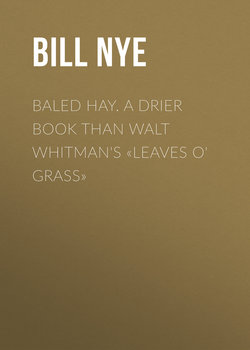Читать книгу Baled Hay. A Drier Book than Walt Whitman's «Leaves o' Grass» - Nye Bill - Страница 18
THE AMENDE HONORABLE
ОглавлениеIT is rather interesting to watch the manner by which old customs have been slightly changed and handed down from age to age. Peculiarities of old traditions still linger among us, and are forked over to posterity like a wappy-jawed teapot or a long-time mortgage.. No one can explain it, but the fact still remains patent that some of the oddities of our ancestors continue to appear from time to time, clothed in the changing costumes of the prevailing fashion.
Along with these choice antiquities, and carrying the nut-brown flavor of the dead and relentless years, comes the amende honorable. From the original amende in which the offender appeared in public clothed only in a cotton-flannel shirt, and with a rope about his neck as an evidence a formal recantation, down to this day when (sometimes) the pale editor, in a stickful of type, admits that "his informant was in error," the amende honorable has marched along with the easy tread of time. The blue-eyed moulder of public opinion, with one suspender hanging down at his side, and writing on a sheet of news-copy paper, has a more extensive costume, perhaps, than the old-time offender who bowed in the dust in the midst of the great populace, and with a halter under his ear admitted his offense, but he does not feel any more cheerful over it.
I have been called upon several times to make the amende honorable, and I admit that it is not an occasion of mirth and merriment. People who come into the editorial office to invest in a retraction are generally very healthy, and have a stiff, reserved manner that no cheerfulness of hospitality can soften..
I remember of an accident of this kind which occurred last summer in my office, while I was writing something scathing. A large map with an air of profound perspiration about him, and a plaid flannel shirt, stepped into the middle of the room, and breathed in the air that I was not using. He said he would give me four minutes in which to retract, and pulled out a watch by which to ascertain the exact time.
I asked him if he would not allow me a moment or two to go over to the telegraph office and to wire my parents of my awful death. He said I could walk out of that door when I walked over his dead body. Then I waited a long time, until he told me my time was up, and asked what I was waiting for. I told him I was waiting for him to die, so that I could walk over his dead body. How could I walk over a corpse until life was extinct?
He stood and looked at me first in astonishment, afterward in pity. Finally tears welled up in his eyes, and plowed their way down his brown and grimy face. Then he said that I need not fear him. "You are safe," said he. "A youth who is so patient and so cheerful as you are – who would wait for a healthy man to die so that you could meander over his pulseless remnants, ought not to die a violent death. A soft-eyed seraph like you, who is no more conversant with the ways of this world than that, ought to be put in a glass vial of alcohol and preserved. I came up here to kill you and throw you into the rain-water barrel, but now that I know what a patient disposition you have, I shudder to think of the crime I was about to commit."
